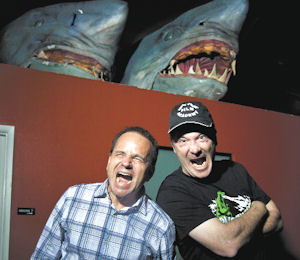Looking to produce films for underserved minority markets, mini-studio The Asylum has opened its doors to outside story pitches. The Burbank production and distribution company hopes to use those films as its entry into theaters, part of a two-pronged growth strategy that includes producing more content for television. The Asylum began promoting that it’s accepting outside submissions for Latino and African-American genre films on its website last month. After just one week, Chief Operating Officer Paul Bales was convinced that, based on the scripts Director of Development Micho Rutare had read so far, the company’s decision was the right one. The Asylum looks to make its first film from the submissions in early 2012, and is aiming to make one film per quarter. “This is not our personal demographic (for the staff) so we are looking authentic voices that can give good stories in these genres,” Bales said. Targeting minority audiences presents a ripe opportunity for The Asylum to expand from home entertainment distribution to home entertainment and television, and eventually into movie theaters. A July 2011 survey, conducted by mobile marketing agency Briabe Mobile and social networking site MocoSpace, found that 24 percent of Hispanic Americans went to the movies three times a month and 19 percent of African Americans went with the same frequency. Hispanics ages 18 years to 24 years old are the most frequent moviegoers, according to the survey. Other production companies are already on a mission to attract those viewers. In September 2010, for instance, Lionsgate announced a partnership with Mexico-based media conglomerate Televisa to release eight to 10 films targeting the U.S. Latino moviegoers. Home entertainment distributor Image Entertainment Inc. in Chatsworth has a division, One Village Entertainment, dedicated to African-American films. Bales said one theater chain has confirmed that both markets are underserved by Hollywood and audiences are clamoring for them. “We are looking to start small and work that way,” Bales said. ‘Mega Python vs. Gatoroid’ David Latt and David Rimawi founded The Asylum in 1997 as a distributor of art house and independent films. A third founding partner left the company about five years ago and was replaced by Bales. The company later transitioned into distributing and producing genre films — science fiction, horror, westerns and musicals. The Asylum has an aggressive production schedule of releasing 15 films this year and between 20 films to 24 films next year, Latt said. “We are a cash flow company, so we need to make and release films every month or we close our doors,” he said. The Asylum owns all the films it makes and distributes them through DVD, video-on-demand and online streaming. Cable channels Syfy and Lifetime have shown original films from The Asylum that attracted large viewership. The Asylum is among eight production companies Syfy works with for original movies. The company makes its films with the eye-catching and over-the-top look the network wants, said Thomas Vitale, executive vice president of programming and original movies for Syfy and Chiller, a cable channel for horror content. Headquarters: Burbank CEO: David Rimawi 3-year growth rate: 40 percent Revenue 2010: $7 million Revenue 2009: $8 million Revenue 2008: $5 million The 2010 film “Mega Piranha” led The Asylum to work with 1980s pop singer Tiffany. That collaboration led to Tiffany starring with fellow singer Debbie Gibson in the campy creature feature, “Mega Python vs. Gatoroid.” “The secret to their success is they love what they are doing and make their movies in a true independent spirit,” Vitale said. He said The Asylum can likely succeed with the goal of getting films into theaters, because the company understands how to create buzz and promotion. When “Mega Python vs. Gatoroid” aired on Syfy earlier this year, the movie was splashed across a two-page spread in Entertainment Weekly and written up in The New York Times, Vitale said. Taking ‘calculated risks’ Screenwriters submitting screenplays to The Asylum need not have produced a feature film, but they must be familiar with the technical requirements specific to movie writing, Bales said. “We are always happy to give an opportunity to new people,” he said. As The Asylum picks up the total cost of production, budgets for feature films are modest — in the $250,000 to $700,000 range. Television work is more expensive. The first project for Syfy, “Megafault,” cost nearly $2 million. The 2009 thriller about a giant earthquake fault across the U.S. was directed by Latt and written by Bales. The price tag was a bit of a stretch for the small company, and normally the company would not take such a risk, Bales said, but it resulted in increased awareness for The Asylum and more business. The company did two other commissioned Syfy movies and is contracted to make three more. Two more films are planned for the Lifetime channel. “We like to be conservative about growth,” Bales said. “We also recognize we have to take some risks. They are calculated risks.”
